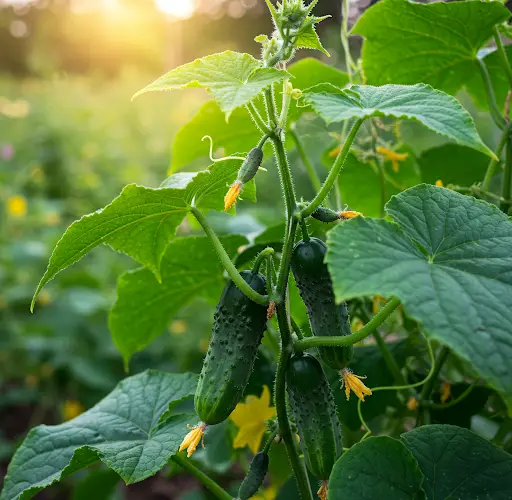How to Protect Cucumbers from Heat and Drought: A Gardener’s Guide for Summer Success
Cucumbers are among the most rewarding summer vegetables, offering crisp, refreshing fruit perfect for salads, pickling, or eating straight from the vine. However, they are also sensitive to environmental stress—especially heat and drought. As summer temperatures rise and rainfall becomes less predictable, it’s important for gardeners to adapt their care routines to keep cucumbers thriving.
If you’ve noticed your cucumber plants wilting, producing misshapen fruit, or slowing in growth, heat stress and water deficiency may be to blame. The good news is, with a few key strategies, you can maintain healthy, productive plants even through extreme summer conditions. Here’s how:
1. Mastering Proper Watering Techniques
Watering is arguably the most critical factor in cucumber care during hot weather. These plants are composed largely of water, and they require a steady supply to grow and produce healthy fruit.
-
Water Early or Late: Always water cucumbers in the early morning or late evening. This timing minimizes water loss due to evaporation and allows the roots to absorb moisture more effectively.
-
Deep, Consistent Watering: A shallow sprinkle won’t do. Aim for deep watering two to three times per week, depending on rainfall and soil type. This encourages the roots to grow deeper, helping the plant access moisture even during dry spells.
-
Avoid Waterlogging: While cucumbers love moisture, they do not tolerate soggy soil. Ensure your garden beds have good drainage to prevent root rot.
2. Use Mulch to Lock in Moisture
Mulching is a simple yet powerful way to support cucumbers during drought.
-
Natural Materials Work Best: Apply a 2–3 inch layer of organic mulch, such as straw, grass clippings, compost, or wood chips, around the base of the plants.
-
Benefits of Mulching: Mulch reduces soil temperature, locks in moisture, and suppresses weed growth. As it breaks down, it also enriches the soil.
-
Mulch Regularly: Replenish mulch throughout the season as it decomposes or gets displaced.
3. Regulating Temperature with Shade
Excessive heat can quickly take a toll on cucumber vines. While these plants do love sun, too much intense sunlight can cause stress, blossom drop, or poor fruit development.
-
Provide Temporary Shade: Use shade cloths, garden fleece, jute bags, or old bed sheets to shield the plants during the hottest part of the day.
-
DIY Shade Structures: You can construct simple frames or hoops over your beds to hold the shading material a few inches above the plants.
-
Smart Positioning: If you’re container gardening, consider moving pots to spots that receive filtered sunlight in the afternoon.
4. Boost Soil Health with Organic Nutrients
Healthy soil holds water better and supplies essential nutrients that help plants cope with heat stress.
-
Compost and Aged Manure: Both are excellent soil conditioners that improve water retention, aeration, and nutrient availability.
-
Frequent but Light Feeding: During hot weather, small but regular additions of compost tea or diluted organic fertilizer can keep plants energized without overwhelming them.
-
Avoid Over-Fertilizing: High doses of nitrogen can lead to lush leaf growth at the expense of fruit production—balance is key.
5. Stay Ahead of Pests and Diseases
Hot and dry conditions can create the perfect storm for pests such as aphids, spider mites, and whiteflies, as well as fungal diseases like powdery mildew.
-
Inspect Regularly: Check leaves (especially the undersides) every few days for signs of infestation or disease.
-
Encourage Beneficial Insects: Ladybugs, lacewings, and parasitic wasps can naturally reduce pest populations.
-
Natural Treatments: Neem oil, insecticidal soap, or garlic spray are all effective organic methods for managing pests. For fungal issues, try baking soda sprays or sulfur-based treatments early in the morning or after watering.
Final Thoughts
Caring for cucumbers in the heat of summer doesn’t have to be stressful. With strategic watering, proper mulching, smart shading, nutrient-rich soil, and vigilant pest control, you can ensure that your cucumber plants continue producing healthy fruit throughout the season.
The effort you put in now will reward you with a bountiful harvest of crisp, juicy cucumbers—perfect for cooling off on hot days and sharing with friends, family, or neighbors.
Whether you’re growing cucumbers in raised beds, containers, or directly in the ground, these practices will help your plants not only survive but thrive—even during the harshest summer spells.



